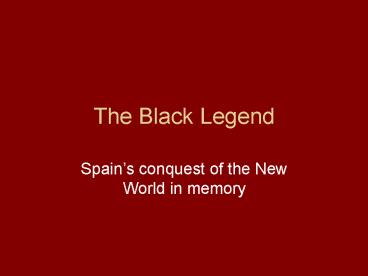The Black Legend - PowerPoint PPT Presentation
1 / 24
Title: The Black Legend
1
The Black Legend
- Spains conquest of the New World in memory
2
- A distinctive feature of legends is that their
veracity is in some way suspect. A legend is a
story that someone else believes.1 - 1 Charles Gibson, The Black Legend (1969)
3
What is Historical Memory?
- In part, it is how society chooses to remember
certain events of the past.
4
What effects memory?
- Self-interest is a powerful motivator in shaping
the way humans remember the past.
5
How does the past change?
- Indeed, the interpretation of the past can and
does change dramatically over time. New societal
norms, political objectives, varying cultural or
religious perspectives are but a few factors that
change the moral assessment given to the events
of the past.
6
The Black Legend
- This presentation will look at the contested
memory of Spain as both a European power and as a
colonial empire. - In short, we will examine the Black Legend.
7
What is the Black Legend?
- The importance of Las Casass Very Brief
Relation. (Only work of Las Casas published
within 300 years of his lifetime.)
8
Other Origins of the Black Legend
- Trends coinciding with Las Casass Very Brief
Relation (1552) - The Inquisition (Spanish)
- The Protestant Reformation Religious Wars
- French Wars (1562-1598)
- Netherlands Revolt (1567-1593)
- Sinking of Spanish Armada by England (1588)
- Thirty Years War (1618-1648)
9
Early Critics
- William of Orange (Hero of Protestant
Netherlands) Apologia (1580) - Accusations of Spanish brutality, sloth, and
depravity. - Mentions Spains atrocities in New World (cites
Las Casas) - Fighting King Philip II of Spain for independence
- Coincides with early Dutch translation of Brief
Relation.
10
Black Legend in the New World Las Casas is
translated into English
- The first English translation of Las Casas
appears in Oliver Cromwells England in 1656 The
Tears of the Indians Being an Historical and
True Account of the Cruel Massacres and Slaughter
of Above Twenty Millions of Innocent People
11
Oliver Cromwell
- Cromwells Speech at the Opening of Parliament
(1656) repeats the account of Las Casas, recently
translated into English.
12
Anti-Spanish Literature in the Enlightenment era.
- Baron de Montesquieu, Persian Letters (1721)
- Voltaire Alzire, 1736
- Emphasizing, describing reasons for the decline
of Spain. Both familiar with Las Casas.
13
Modern Critics
- Lew Wallace, The Fair God (1873)
- Continuing in the Protestant tradition of beating
up on Spain - A time of turmoil in Latin America Looking for
answers.
14
More Modern Critics of Spain
- Diego Riveras political murals depict a modern
interpretation of the Black Legend.
On one hand, an idealized Indian past
15
Rivera
- In Riveras murals, the Conquistadors stand in as
a metaphor for greed, capitalism, and European
brutality. They are the words of Las Casas put
into pictures.
I took this picture at the National Palace in
Mexico City, Fall 2003
16
Riveras Perspective
- A self-styled champion of the underclass and
Indian causes, Rivera also identified with
Marxism. His works often celebrated Socialist
ideals the very opposite philosophy, at least
on paper, of European imperialism.
Diego Rivera and exiled Russian Revolutionary Leo
Trotsky (before Trotsys ended up with an icepick
in his back!)
17
Contemporary Black Legend
- The elevation of Las Casas
- His writings are on almost every course syllabus,
often uncritically, in classes that deal with the
Spanish conquest - Las Casas as a path-breaker. An early champion of
human rights struggles. (A predecessor of Ghandi,
King, Mandella.) - Las Casass stories are most useful in this
regard, especially if they are true.
18
Attacking the Black Legend
- Spanish apologists Julián Juderias, The Black
Legend (1914) - Coins the term Black Legend in every sense of
the word, legend - Construction of the White Legend.
- Las Casas was a liar.
- Spain spread greater good in the New World, far
in excess of any bad. - Las Casas, if true, was an isolated incident
19
Food for thought
- How different was Spains conquest of the New
World with that of the Protestant European
powers? (Dutch, English) - Persistance of Indianismo
- The Mestizo vs the absent English counterpart
The creation of Latino society.
20
Contemporary Conflicts Oñate
In 1598, Don Juan de Oñate crossed the Rio
Grande, becoming the first European (he was
actually a mix of Spanish and Indian a mestizo,
or perhaps more accurately, a Latino) to enter
what is today the American Southwest.
21
One Hand Heroic Oñate
- Oñate, by virtue of being the first Latino to
cross the Rio Grande has become something of a
hero in the US Latino community. - Growing politically powerful, these Latino
communities want to validate their position
through statues of Oñate. - Hes become something of a Latin George
Washington.
22
Theres a rub
- Oñate could be one mean hombre when he wanted to
- After an uprising at the Acoma pueblo, he
punished 24 of the men by chopping off their
right foot, among other grisly things - Even King Phillip II of Spain ordered an
investigation of his overly zealous behavior when
punishing hostile Indians.
23
Monumental Controversy
- Descendants of the Acoma vs. Conquistador
champions The Oñate monument craze. - A barometer of political power and its influence
on historical memory.
24
Points to ponder
- What forces drive historical memory?
- Is an objective truth possible?
- In criticizing the Black Legend do we fabricate
a White Legend in its place? - How much of an historical narrative is really
about the present than the past?



























![READ [PDF] Under the Black Flag: The Romance and the Reality PowerPoint PPT Presentation](https://s3.amazonaws.com/images.powershow.com/10112773.th0.jpg?_=20240830072)


![[PDF] DOWNLOAD Colt : An American Legend PowerPoint PPT Presentation](https://s3.amazonaws.com/images.powershow.com/10123055.th0.jpg?_=202409061011)
